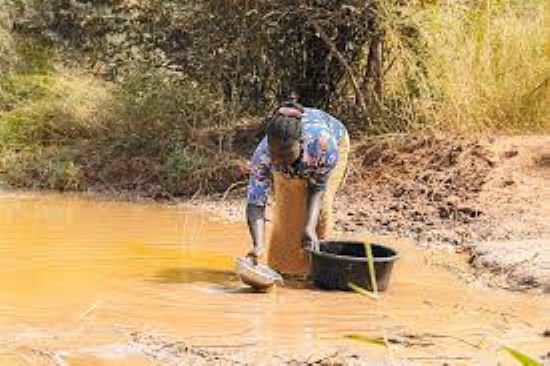Water is the lifeblood of agriculture, yet Nigeria is facing an escalating water crisis that threatens food security, livelihoods, and economic stability. Despite having vast water resources, poor management, climate change, and increasing demand are depleting supplies at an alarming rate. As rainfall patterns become more erratic and droughts intensify, farmers across Nigeria are struggling to sustain their crops and livestock.

Why is Nigeria’s water crisis worsening?
- Climate change and unpredictable rainfall
Nigeria’s rainy season is no longer as reliable as it once was. The Nigerian Meteorological Agency (NiMet) has reported a 20% reduction in average annual rainfall in northern states over the past two decades. Drought-prone regions such as Borno, Yobe, and Sokoto states now experience prolonged dry spells, making irrigation-dependent farming increasingly difficult.
- Desertification and shrinking water bodies
Lake Chad, once a major source of water for agriculture, has shrunk by 90% since the 1960s, according to the United Nations Environment Programme (UNEP). The receding lake has left millions of farmers, herders, and fishermen in northern Nigeria without reliable water access. Desertification continues to spread southward, consuming an estimated 350,000 hectares of land annually.
- Over-extraction and groundwater depletion
As surface water sources decline, farmers and urban centres increasingly depend on groundwater. However, unregulated borehole drilling is rapidly depleting underground reserves. The Nigeria Integrated Water Resources Management Commission (NIWRMC) warns that groundwater levels in key agricultural regions like Kano and Katsina states have dropped by over 15 metres in the past decade.
- Pollution and water contamination
Nigeria’s water bodies are heavily polluted due to industrial waste, poor sanitation, and agricultural runoff. The Federal Ministry of Water Resources estimates that 70% of surface water sources in Nigeria are contaminated, posing risks not only to human health, but also to crops and livestock. Contaminated irrigation water reduces agricultural yields and increases the spread of waterborne diseases.
How is the water crisis affecting agriculture?
- Declining crop yields
With less water available for irrigation, farmers are experiencing significant losses. A study by the International Institute of Tropical Agriculture (IITA) found that drought conditions in 2023, reduced rice and maize production in Nigeria by over 30%. Without urgent intervention, food shortages will worsen, driving up prices and increasing hunger.
- Conflict between farmers and herders
The water crisis is intensifying conflicts between farmers and pastoralists. As rivers and grazing lands dry up, herders move southward in search of water, leading to clashes with crop farmers. The Institute for Peace and Conflict Resolution (IPCR) reported that water-related disputes contributed to over 60% of farmer-herder conflicts in Nigeria in 2023.
- Livestock losses and economic impact
For Nigeria’s livestock industry, water scarcity is devastating. Thousands of cattle, goats, and sheep perish each year due to dehydration and lack of pasture. The National Agricultural Extension and Research Liaison Services (NAERLS) estimates that Nigeria’s livestock sector lost over ₦200 billion in 2023 due to water shortages.
Can Nigeria overcome its water crisis?
- Investment in irrigation infrastructure
Less than 2% of Nigeria’s farmland is irrigated, making the country highly dependent on rainfall. Expanding irrigation networks using drip irrigation and water-efficient systems can help farmers maximise limited water resources. The World Bank recently pledged US$500 million for irrigation projects in Nigeria, but proper implementation is crucial.
- Rainwater harvesting and water recycling
Harvesting and storing rainwater can help farmers survive dry seasons. Simple solutions like rooftop rainwater collection and underground reservoirs are already proving effective in rural communities. Treated waste water from cities could be safely recycled for irrigation, reducing pressure on freshwater sources.
- Sustainable groundwater management
To prevent over-extraction, Nigeria must enforce stricter borehole regulations and promote responsible groundwater use. In India for instance, community-led groundwater recharge programmes have successfully restored depleted water tables, a model, which Nigeria could adopt.
- Reforestation and watershed protection
Planting trees and restoring wetlands can help regulate water cycles and prevent desertification. Countries like Ethiopia have reversed land degradation through massive tree-planting initiatives. If Nigeria invests in large-scale afforestation projects, water retention in key agricultural zones could improve.
- Climate-resilient farming techniques
Farmers need training in drought-resistant crops, conservation agriculture, and efficient water use. Crops like sorghum, millet, and cassava require less water than rice or maize and can withstand harsher conditions. Expanding research into climate-smart agriculture would help Nigeria adapt to its changing environment.
The future: A water-scarce Nigeria?
If Nigeria fails to address its water crisis, the consequences could be severe. By 2050, food production could decline by up to 50%, leading to higher import dependence, rising food prices, and increased poverty. However, with the right policies, investments, and community-driven solutions, Nigeria can secure its water future and sustain its agriculture sector. The question remains: Will Nigeria act now, or will the water crisis push millions into deeper food insecurity? Time will tell!



